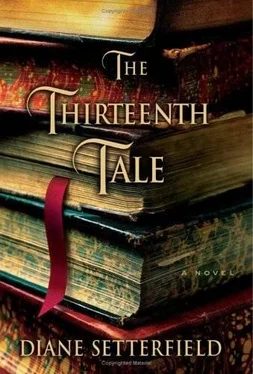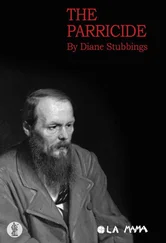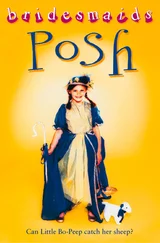The doctor smiled at me at the end of my speech and said lightly, "Perhaps you should write your own book. " This gave me exactly the opportunity I have been seeking for some time.
I pointed out to him that the perfect case study for such a book was at hand here in Angelfield House. That I could devote a few hours every day to working on writing up my observations. I sketched out a number of trials and experiments that could be undertaken to test my hypothesis. And I touched briefly on the value that the finished book would have in the eyes of the medical establishment. After this I lamented the fact that for all my experience, my formal qualifications are not grand enough to tempt a publisher, and finally I confessed that, as a woman, I was not entirely confident of being able to bring off such an ambitious project. A man, if only there were a man, intelligent and resourceful, sensitive and scientific, having access to my experience and my casestudy, would be sure to make a betterjob of it.
And in such a manner it was decided. We are to work together!
I fear Mrs. Dunne is not well. I lock doors and she opens them. I open curtains and she closes them. And still my books will not stay in theirplace/ She tries to avoid responsibility for her actions by maintaining that the house is haunted.
Quiteby chance, her talk of ghosts comes on the very day the book I am in the middle of reading has completely disappeared, only to be replaced by a novella by Henry James. I hardly suspect Mrs. Dunne of the substitution. She scarcely knows how to read herself and is not given to practical jokes. Obviously it was one of the girls. What makes it noteworthy is that a striking coincidence has made it a cleverer trick than they could have known. For the book is a rather silly story about a governess and two haunted children. I am afraid that in it Mr. James exposes the extent of his ignorance. He knows little about children and nothing at all about governesses.
It is done. The experiment has begun.
The separation was painful, and if I did not know the good that is to come of it, I should have thought myself cruel for inflicting it upon them. Emmeline sobs fit to break her heart. How is it for Adeline? For she is the one who is to be the most altered by the experience of independent life. I shall know tomorrow when we have our first meeting.
There is no time for anything but research, but I have managed to do one additional useful thing. I fell into conversation today with the schoolteacher outside the post office. I told her that I had spoken to John about the truant and that she should come to me if the boy is absent again without reason. She says she is used to teaching half a class at harvesttime when the children go spud-hucking with their parents in the fields. But it is not harvesttime, and the child was weeding the parterres, I told her. She asked me which child it was, and I felt foolish at not being able to tell her. The distinctive hat isno help atall in identifying him, since children do not wear hats in class.Icould go back to John but doubt he will give me more information than last time.
I am not writing my diary much lately. Ifind that after the writing, late at night, of the reportsI prepare every day about Emme line'sprogress, I am frequently too tired to keep up withmyown record of my activities. And I do want to keep arecord of these daysand weeks, for I am engaged, with the doctor, on very important research, and in years to come, whenI havegone away and left thisplace, I may wish to look back and remember. Perhaps myefforts withthe doctor will open some door for me into further work of this kind, forI find the scientific and intellectual work more engrossing and more satisfying than anything I have ever done. This morning for instance, Dr. Mauds ley and I had the most stimulating conversation on the subject ofEmme line's use ofpronouns. She is showing an ever-greater inclination tospeak to me, and her ability to communicate improves every day. Yet the one aspectofherspeechthat is resistant to development is the persistence of the first person plural. "We went to the woods, " she will say, and alwaysI correct her: "I went to the woods. "Like a little parrot she will repeat "I" after me, but in the very next sentence, "We saw akitten in the garden, " or some such thing.
The doctor and I are much intrigued bythispeculiarity. Is it simplyan ingrained habit ofspeech carried over from her twin language into English, a habit that will in time right itself? Or does the twinness go so deep in herthat even in her language she is resistant to the idea of having aseparate identity from that of her sister? I told the doctor about imaginary friends thatsomany disturbed children invent, and together we explored the implications ofthis. What if the child's dependence onher twin is so great that the separation causes a mental trauma such that the damaged mind provides solace bythe creation of an imaginary twin, afantasy companion? We arrived at no satisfactory conclusion but parted with the satisfaction of having located another area of future study: linguistics.
What with Emmeline, and the research, and the general housekeeping that needs to be done, I find I am sleeping too little, and despite my reserves of energy, which I maintain by healthy diet and exercise, I can distinguish the symptoms of sleep deprivation. I irritate myself by putting things down and forgetting where I have left them. And when I pick up my book at night, my bookmark tells me that the previous night I must have turned the pages blindly, for I have no recollection at all of the events on the page or the one before. These small annoyances and my constant tiredness are the price I pay for the luxury of working alongside the doctor on ourproject.
However, that is not what I wanted to write about. I meant to write about our work. Not ourfindings, which are documented thoroughly in our papers, but the pattern of our minds, the fluency with which we understand each other, the way in which our instant understanding permits us almost to do without words. When we are both engaged in plotting the changes in sleep patterns of our separate subjects, for instance, he may want to draw my attention to something, and he does not need to speak, for I can feel his eyes on me, his mind calling to me, and I raise my head from my work, quite ready for him to point out whatever it is.
Skeptics might considerthis pure coincidence, or suspect me of magnifying a chance incidence into a habitual occurrence by imagination, but I have come to see that when two people work closely together on a joint project - two intelligent people, I mean to say - a bond of communication develops between them that can enhance their work. All the while they arejointly engaged on a task, they are aware of, acutely sensitive to, each other's tiniest movements, and can interpret them accordingly. This, even without seeing the infinitesimal movements. And it is no distraction from the work. On the contrary, it enhances it, for our speed of understanding is quickened. Let me add one simple example, small in itself but standing in for countless others. Thismorning, I was intent upon some notes, trying to see a pattern of behavior emerging from his jottings on Adeline. Reaching for a pencil to make an annotation in the margin, I felt the doctor's hand brush mine and he passed the pencil I sought into it. I looked up to thank him, but he was deeply engrossed in his own papers, quite unconscious of what had happened. In such a way we work together: minds, hands, always in conjunction, always anticipating the other's needs and thoughts. And when we are apart, which we are for most of the day, we are always thinking of small details relating to the project, or else observations about the broader aspects of life and science, and even this shows how well suited we arefor this joint undertaking.
Читать дальше












